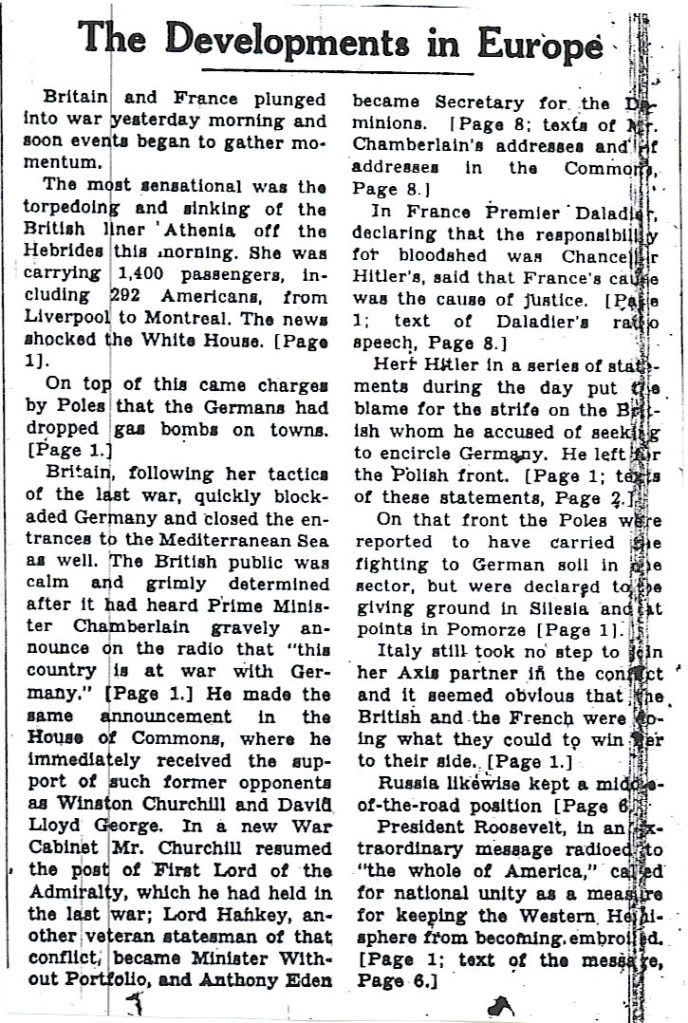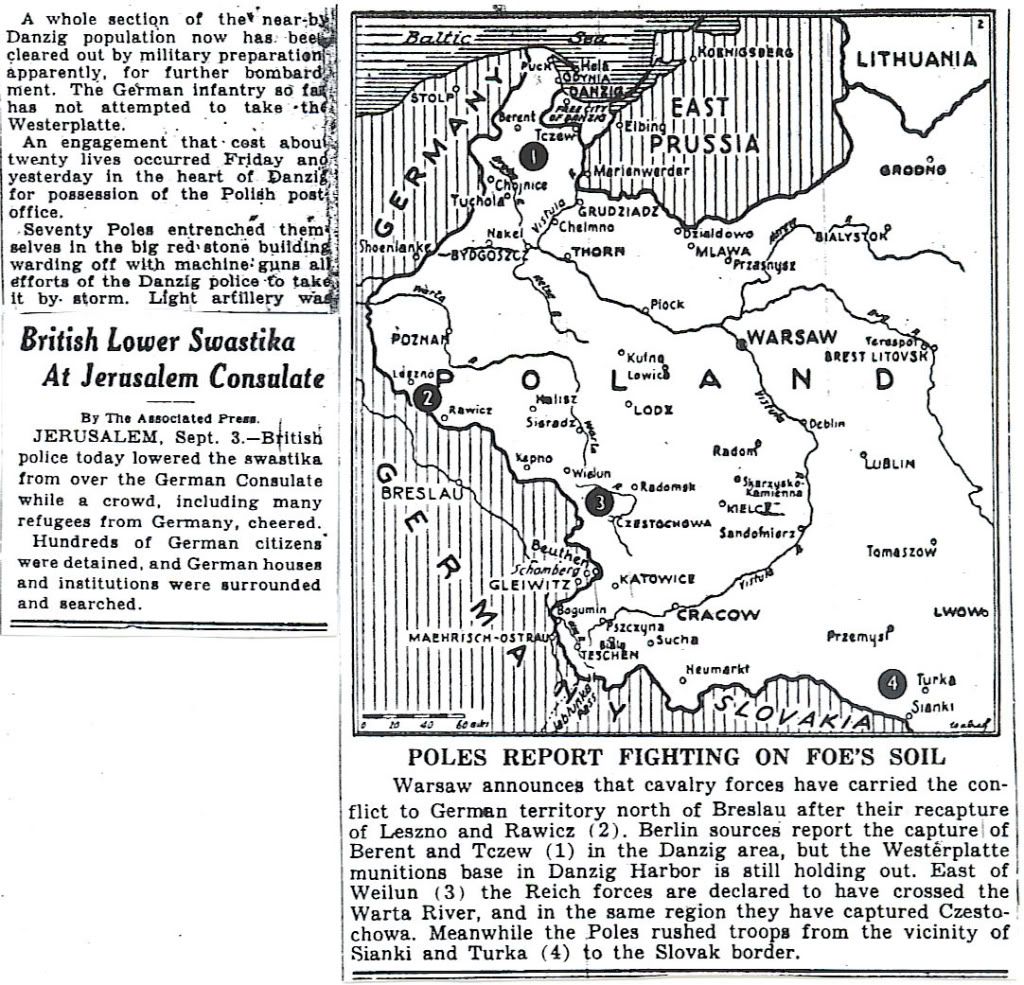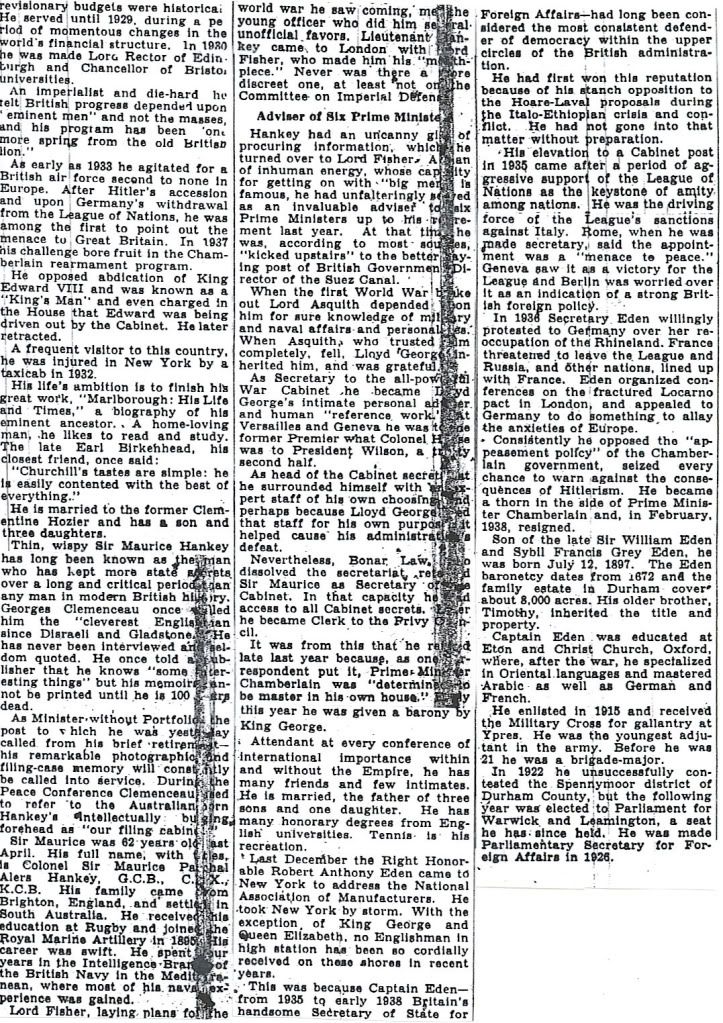
Posted on 09/04/2009 5:14:01 AM PDT by Homer_J_Simpson

































Wait till next May....
At least something hit the Germans.
U-boats did not operate in the Carribean until early 1942 during “Operation Drumbeat.” (A very good book of that title by U-Boat expert Michael Gannon I might add).
The main German U Boat in 1939 was the type VII, which had limited range and was really only suited for operations around the Western Approaches and waters of the British Isles.
The larger Type IX had more range, but was available only in limited quantity. Even with more range, it still required a resourceful captain to make it to the Eastern Seaboard of the United States and conduct operations for any length of time. Some U Boats based out of French ports did manage to penetrate the Gulf of Mexico for limited operations in mid-1942, but that’s about as far as they got.
So these reports are just rumors?
Yep. Consider also the limited number of U Boats Raeder & Donitz were able to put to sea at the start of the war. They didn’t have the resources to put U Boats into the Caribbean, and as the most of the shipping there was done by the neutral American nations, it wasn’t profitable to send any there.
Lots of rumors flying around at this time. The press was far more in the dark back then. One other comment I was going to make about the fighting in Poland is that the Germans were not holding daily press briefings with maps regarding the progress of the fighting. If they had, imagine how depressing it would have been for the French, who were already not enthusiastic about this war.
lol.
daily press briefings would have been interesting I bet
Well, they had nothing really to worry about. Andre' Maginot told them so...
"We could hardly dream of building a kind of Great Wall of France, which would in any case be far too costly. Instead we have foreseen powerful but flexible means of organizing defense, based on the dual principle of taking full advantage of the terrain and establishing a continuous line of fire everywhere."—10 December 1929
I agree. 15 years of economic disaster due in large part to the short sightedness of the Treaty of Versailles would put them in that frame of mind and made following Hitler that much easier. Hope and Change isn't such a bold fresh idea.
Quite profound thought. Of all things, Human Nature is the most unchanging.
The Germans concentrated their armour and motorized in to breakthrough divisions, while the French still used them for Infantry support. They had lots of them, and many were better than German tanks, but they spread them too thin to be effective.
Fort Eban Emaul (Spelling?) being taken by just two companies of German Airborne finished the idea of forts forever....
Read any of the Germans’ memoirs from the period and you realize that the superior “will to fight” was most noticeable at the battalion and company level. The average German mid-level commander was willing and eager to “get after it” and the German command style was geared to take advantage of it. German commanders were given broad objectives (take this town, cross that river, reach the objective...) and it was left to the commander to figure out how to do it. Plus, the Germans excelled at creation of ad hoc combined arms Kampfgruppe to carry out these missions, and a verbal request for air or artillery support was routinely and quickly carried out.
Contrast with the French model of command where the battalion commander received detailed written orders on what to do and how to do it. Of course, these orders ran afoul of one of Clausewitz’ maxims: “No plan survives it’s first contact with the enemy.” Any change of plan required a written request for new written orders.
Look at the Wehrmacht as a private sector enterprise, and the French as a typical government bureaucracy. That pretty much tells the difference of why the Germans were better at the the fluid and brutal world of modern combat.
For the next several months the papers will be full of rumors and reports about the German and Italian Merchant Raiders.
Some will be reported sunk, several different times. And the GErman press will play up their exploits, as propoganda.
Thanks for this. The excellent quality of the journalism is remarkable to me, especially in comparison to the twaddle we typically see today.
The raiders, particularly the Graf Spee, will do more than the submarines for the first year of the war. They have the speed, cruising range and hitting power to make life miserable for the British merchant system. The British do not have the surface forces necessary (at first) to combat them.
However, the British finally tighten up their stranglehold on the Kriegsmarine, mostly due to the fact that they can send out task groups with aircraft carriers, while the Germans don’t have any. Also, Ultra intercepts and a sophisticated world-wide net of radio triangulation allows the Royal Navy to hunt down the raiders, many of which don’t sortie out of the North Sea.
Operation Rheinubung, the sortie of Bismarck and Prinz Eugen, will be the last German surface raiders in the Atlantic. From then on, Hitler’s surface navy is bottled up in Norweigian fjords and pretty much out of the war.
Yes, and we use this same de-centralized approach of "mission orders" and "nesting" with commander's intent, method and end state with our forces today.
“That’s because the German Navy was still being run by officers who respected the rules of war regarding avoidable civilian casualties.”
An example of that will happen tomorrow:
At 12.00 hours on 5 Sep, 1939, U-48 opened fire with the deck gun for 25 minutes at the unescorted Royal Sceptre (Master James William Gair) about 300 miles northwest of Cape Finisterre. The ship had sent distress signals when the U-boat was sighted and tried to escape. She was sunk by a coup de grâce at 13.38 hours after the crew had abandoned ship in the lifeboats. The master was killed and nine crew members were wounded by gunfire.
Three hours later, the sub will stop the M/V Browning. The crew first abandoned ship in panic, but they were ordered by the Captain of U-48, Herbert Schultze, to reboard their vessel and to pick up the survivors of Royal Sceptre.
Schultze will survive the war, and later serve in the Bundesmarine, retiring in 1968. He passed in 1987.
There was this into the Artic Ocean, in 1943. Not a good outcome for the Kriegsmarine.
http://en.wikipedia.org/wiki/Operation_Ostfront
Duke of York v. Scharnhorst; the last daylight big-gun battle between capital ships without aerial interference.
It was a mis-match; Scharnhorst’s 11” guns were no match for the 10 14” guns of a KGV class battleship. The Brits had better radar fire control in the bad weather off the North Cape. There had been plans to up-gun Scharnhorst and her sister Gneisenau, but the Germans never got around to it.
Disclaimer: Opinions posted on Free Republic are those of the individual posters and do not necessarily represent the opinion of Free Republic or its management. All materials posted herein are protected by copyright law and the exemption for fair use of copyrighted works.